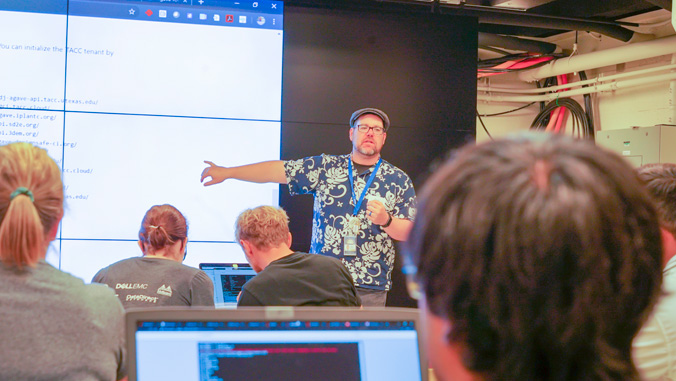
The National Science Foundation has awarded a nearly $1-million grant to the University of Hawaiʻi Hawaiʻi Data Science Institute (HI-DSI) supporting cyberinfrastructure (CI) training for climate scientists and students in the Hawaiʻi-Pacific region. The three-year grant will help create workshop and curriculum models for undergraduate and graduate students to increase their cyberinfrastructure skills across the climate science domain.




The project, titled “Cyberinfrastructure Training to Advance Climate Science” (CI-TRACS), will help build essential CI skills for the Hawaiʻi-Pacific workforce through 36 undergraduate and 12 graduate student training experiences and 10 new publicly available workshops to increase CI awareness and skills.
“This project will bring together climate scientists and computer scientists,” said UH Mānoa Assistant Professor of Information and Computer Sciences Peter Sadowski, who serves as a fellowship mentor on the project. “I’m particularly excited about the opportunities to use artificial intelligence to understand climate change, and it’s a great opportunity for students to get involved in interdisciplinary research.”
The first cohort of CI-TRACS fellows includes Department of Molecular Biosciences and Bioengineering doctoral student Bjarne Bartlett, Department of Information and Computer Sciences graduate student Aditi Jaiswal, Department of Oceanography graduate student Oscar Ramfelt and Department of Atmospheric Sciences graduate student Mingyue Tang.
“Computer models have proved to be extremely powerful tools in the study of the Earth’s climate. As technology continues to make progress and models become more sophisticated, it is often a challenge for climate scientists to be able to use state-of-the-art models or learn new programming techniques,” said Department of Atmospheric Sciences Assistant Professor Giuseppe Torri, who also serves as a mentor. “This fellowship will bring together computer and climate scientists precisely to bridge important gaps between the two disciplines. A constructive dialogue between them will allow, for example, the improvement of some of the existing models, it will train new students and give them confidence when using computer models, it will establish best practices that will greatly benefit the community of climate scientists at the University of Hawaiʻi.”
The CI-TRACS training will also increase the pool of CI professionals and facilitate knowledge transfer from existing professionals to the climate science research community. In addition to the year-long fellowship program, summer undergraduate research immersion and CI focused workshops, the project will create a community of practice by establishing the CyberClub program. This program will maintain training materials and community data sets and will also serve as a consultant to stakeholders in state agencies to solve CI challenges in data management, analysis, visualization and dissemination.
CI-TRACS will also disseminate the workshop and curriculum models both nationally and internationally through networks of climate science and CI researchers and practitioners.

